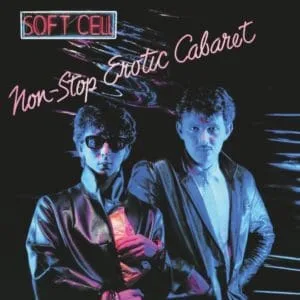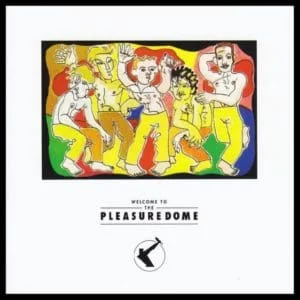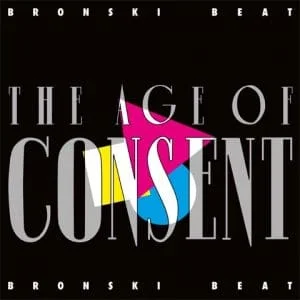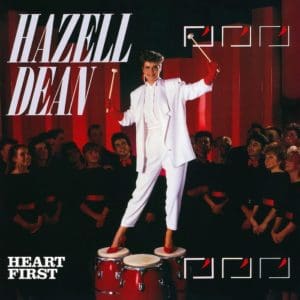As pop and politics clashed to struggle for sexual liberation and queer visibility, some distinctive and courageous new voices emerged because the loudest, regardless of the repercussions… right here we have a look at 1984 – The 12 months Pop Got here Out
Wanting again on the kaleidoscope of vibrant characters that epitomised the gender ambiguity of the early 80s, it’s simple to mistakenly credit score them the seismic shift in attitudes in direction of sexual politics that reached its crescendo in 1984. Whereas there’s no query that the New Romantics, with their scintillating synth-pop and immaculately made-up visages, or Adam Ant and Siouxsie Sioux making fetish-wear trendy sparked debate about gender norms and sexual identification, they have been extra about trend statements than political ones.
As devotees of Bowie, Bolan and glam rock, the intense younger issues monikered the “gender benders” by the press adopted the tropes of their predecessors, blurring the traces between what it was to be masculine and female with their outrageous apparel, however in 1984 it was nonetheless very a lot a case of fashion over substance. For a lot of of people who would later discover the braveness and the voices to change into progressive forces of a brand new period of queer liberation, it was not solely in vogue to be imprecise, it was crucial to attain success.

Battle For Equal Rights
“Within the early 80s you have been signed to a report label and informed you needed to invent girlfriends, and for those who didn’t radio would by no means play your data once more and also you’d be ostracised by the press. In brief, your profession could be over,” Marc Almond informed The Herald. “I didn’t wish to say I wasn’t homosexual, however I didn’t say I used to be homosexual both. And on high of that, I didn’t wish to be outlined as a ‘homosexual artist’. I simply wished to be a pop singer. I didn’t come out publicly till 1987 and I want I’d carried out so sooner.”
Almond was simply one of many profitable artists who later used his platform to struggle prejudice and search equal rights for the homosexual neighborhood. Flamboyant of their trend however subdued of their public views, Boy George, Elton John, George Michael and Freddie Mercury telegraphed gayness however have been hiding in plain sight in ’84.
At any time when the topic of intercourse was raised in interviews, Boy George, on the time the asexual, family-friendly pantomime dame of pop, was readily available with a witty riposte corresponding to he “most well-liked a cup of tea to intercourse” whereas behind the scenes, his turbulent relationship with Tradition Membership’s drummer Jon Moss was the supply materials for most of the group’s hits. Elton John, who had beforehand admitted to being bisexual, married studio engineer Renate Blauel and George Michael stopped shoving shuttlecocks down his shorts and dressing up as an airline pilot to domesticate a safer picture (full with an identikit Princess Diana haircut) and paraded a stream of glamorous girlfriends.
Breaking Free
Though revered as considered one of rock’s most flamboyant frontmen, Freddie Mercury by no means publicly addressed his sexuality, accompanied to most public occasions by ‘soulmate’ Mary Austin. 1984 was the 12 months he famously persuaded his bandmates (by the way, naming the group Queen was at all times meant to imply regal somewhat than the often-misunderstood double entendre) to decorate in drag as Coronation Road-kind characters for the video to I Need To Break Free and was closely influenced by underground homosexual golf equipment for his solo materials. He was an everyday at New York’s S&M golf equipment corresponding to The Anvil and Mineshaft and never solely appropriated the look of the golf equipment’ patrons, the moustache and tight vest, but additionally the pumping hi-NRG soundtrack for his solo materials.
“I don’t blame them [for hiding their sexuality] as a result of everybody was terrified,” Almond continued. “Then Jimmy Somerville got here alongside, and he actually put himself on the road, singing about brazenly homosexual themes. He was extremely courageous whereas the remainder of us have been hiding behind the eyeliner!”
The releases of Bronski Beat’s Smalltown Boy and Frankie Goes To Hollywood’s Chill out have been pivotal in highlighting homosexual visibility, with the band’s frontmen, Jimmy Somerville and Holly Johnson respectively, the out and proud voices wanted to talk out in opposition to the bias levelled on the homosexual neighborhood. When it comes to visibility and illustration, homosexual males have been largely nonetheless portrayed as camp and effeminate, the punchline to the jokes on campy sitcoms. Although combating the identical trigger, their approaches have been very completely different. Bronski Beat’s got here from the guts, Frankie’s from the groin.

Chill out, Don’t Do It
“Frankie Goes to Hollywood have been actually the primary ones who got here out and mentioned, ‘Effectively, yeah, we’re homosexual.’ And it brought on a shockwave, but it surely additionally didn’t harm them – it did the other. It propelled Chill out to being big,” Bernard Rose, director of the Chill out and Smalltown Boy movies, informed Yahoo Music. “Bronski Beat have been round earlier than that occurred, however their report got here out after, and so they have been popping out right into a market the place the Frankie factor had already occurred. I don’t precisely suppose it was like their thunder was stolen, however they weren’t the primary. However I do suppose their method was way more politicised and way more critical.”
Whereas Chill out was very animalistic, the pounding, hi-NRG beat and sexual lyrics was sufficient to get the report banned by the BBC earlier than the video, set in a S&M membership and exploring varied fetishes, even entered the equation. Bronski Beat, then again, handled the emotional aspect. The haunting lament of Smalltown Boy handled the brutal actuality of being ostracised for being homosexual and although Jimmy Somerville’s personal story, it spoke to the misfit in everybody. The follow-up, Why?, was a militant assault on homophobia and prejudice – “Contempt in your eyes as I flip to kiss his lips… Are you able to inform me why?”

Inform Me Why?
As a result of Somerville primarily embarked upon a music profession as a happenstance of his activism (he started singing whereas filming a documentary about homosexuality known as Framed Youth: The Rise Of The Teenage Perverts), he was out and proud, a harmful cocktail that earned him disdain not solely from the general public and press, but additionally from his friends, even these nonetheless within the closet. Whether or not it was a results of jealousy or concern on their half, he spoke brazenly in interviews of soiled seems to be and homophobic feedback backstage at Prime Of The Pops or award exhibits.
Slightly than be diminished or silenced for his sexuality, he was unapologetic, brazenly lusting after different pop stars within the pages of Smash Hits, calling the band’s album The Age Of Consent to focus on the UK’s regressive stance on homosexual points and that includes the phone variety of the Lesbian & Homosexual Switchboard on their data.
Thatcher’s Britain
The truth that he was experiencing such hostility and vitriol in what was deemed a way more progressive enterprise shone a light-weight on how hostile life was for homosexual individuals in Thatcher’s Britain. Beneath hearth within the press, from the police and politicians, it’s little surprise that within the face of such persecution and prejudice, homosexual individuals sought solace in music.
One of the crucial primal methods to specific themselves and expertise the sheer pleasure and liberation arrived within the type of hi-NRG, a direct descendent of disco with a more durable, extra digital sound. Clearly influenced by Giorgio Moroder, it had change into the sound of the homosexual underground scene for a few years. Its breakthrough into the mainstream additional evidenced acceptance of homosexual tradition. Originating in San Francisco by DJ/producer Patrick Cowley at his Menergy membership nights at The EndUp in 1982, hi-NRG (initially known as hi-NRG Disco) was an up-tempo tackle disco with the hi-hat eliminated, changed by a tougher bass and the inclusion of a staccato synthesizer and handclaps.
Two vastly influential DJ-meets-drag partnerships, Patrick Cowley with Sylvester and Bobby Orlando with Divine, helped populate the sound. Whereas disco classics spoke of hardship, ache, and emotional defiance within the face of adversity, this new variation was its sluttier sister injecting a sexual frankness into the lyrics. The model shortly took off in New York golf equipment corresponding to The Saint earlier than making its strategy to Europe due to influential DJ Ian Levine, who packed his units at London’s Heaven nightclub with tracks corresponding to Sylvester’s Do Ya Wanna Funk?, Divine’s Native Love (Step By Step) and Ardour by The Flirts.
Heaven Despatched
As songs that had dominated the dancefloors of those homosexual meccas for effectively over a 12 months made their means into the Prime 40 singles charts, the transference of homosexual tradition proved profitable (later dubbed “the Pink Pound”). Hazell Dean’s Searchin’ (I’ve Acquired To Discover A Man), Gloria Gaynor’s I Am What I Am and The Climate Women’ It’s Raining Males have been all huge hits. Ian Levine enlisted US diva Evelyn Thomas for Excessive Power, a observe which immortalised the style over a beat remarkably just like Frankie’s Chill out (although Levine maintains he was influenced by the Village Individuals’s In The Navy).
As hi-NRG crossed over, it transcended the large cities and have become the predominant sound of the golf equipment throughout the nation. DJ and aspiring producer Pete Waterman was in a homosexual membership in Coventry in 1983 when he first heard hi-NRG. “I used to be watching {the marketplace} from a punter’s viewpoint,” he informed The Spectator. “New Order’s Blue Monday was simply taking place, and I used to be pondering, ‘Take a look at this, there’s one thing happening right here’. I had an excellent 4 to 5 months watching {the marketplace} as an insider nearly.”
The revelation turned the impetus of considered one of music’s most profitable groups of all time. In January 1984, Waterman had enlisted songwriters/producers Mike Inventory and Matt Aitken and collectively they got here up with a system that married the dance sound with pop melodies. “Most examples of hi-NRG have been quick on music,” remembers Mike Inventory. “I used to be eager to deliver structured songs into the model. We noticed the membership scene as a real strategy to attain individuals who may purchase data. We took ahead a number of the dance parts into the extra pop initiatives.”

The Hit Manufacturing unit
Their system turned Inventory Aitken Waterman’s gateway to pop success. “We weren’t brazen sufficient to suppose we might tackle EMI or Warner or the large corporations,” Waterman states. “That by no means even got here into our ideas. We simply knew the key report corporations weren’t centered on a market I knew effectively and beloved – the homosexual dance market. They weren’t .”
By the summer time of 1984, SAW had achieved a UK Prime 20 hit with Divine’s You Suppose You’re A Man, the primary however not the final hi-NRG star to bolster their roster. Hazell Dean’s No matter I Do (Wherever I Go), the primary hit they’d additionally written, broke the Prime 10. Each of these data have been instrumental in attracting Useless Or Alive after Pete Burns fell in love with them. After presenting them with a demo of You Spin Me Spherical (Like A File) and an order to “make me sound like Divine”, the music topped the charts – a primary for each SAW and Useless Or Alive.
Out & Proud
As is commonly the case when an underground phenomenon interprets into mainstream success, it immediately loses its cool issue. Critics have been already writing hi-NRG’s obituary, wildly prematurely because it seems because it not solely was a template for a lot of huge hits to return, but additionally the muse for SAW’s unstoppable run of hits spanning the remainder of the last decade and past (it must be mentioned, courtesy of a string of ‘protected’, pop-star-next-door varieties).
Obituaries have been sadly changing into all too frequent because the 12 months drew to an in depth with homosexual nightlife decimated by the unfold of HIV and AIDS which was wiping out homosexual males in droves. Except for the utter devastation and tragedy of the deaths themselves, the ‘homosexual plague’ tag had an immeasurable impression on a neighborhood already underneath assault. Homosexual individuals have been as soon as once more shamed and vilified, eradicating a lot of the progress of the previous couple of years. Though some very powerful instances have been nonetheless to observe, the merging of pop and politics ensured that 1984 was undoubtedly the 12 months pop kicked open the closet door, and it was by no means closed once more.
For LGBTQIA+ psychological well being help click on right here
Learn Extra: Make It Large: The Story Of 1984

